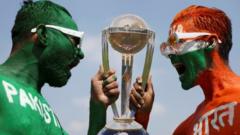In the world of cricket, few rivalries have been as celebrated and intense as that between India and Pakistan. The new Netflix documentary, The Greatest Rivalry: India v Pakistan, captures the spirit of this enduring contest, showcasing heart-wrenching moments and fierce competitions that reflect a unique bond intertwined with national pride. Former Indian cricketer Virender Sehwag described it as "a contest bigger than one between the bat and ball," and fellow players like R Ashwin emphasize its significance, suggesting it rivals even the historic Ashes series.
However, the past few years have raised doubts about whether this rivalry retains its competitive edge as India has outperformed Pakistan decisively. Following India's recent successful run, including a dominating Champions Trophy victory, some commentators suggest the longstanding rivalry may be more myth than reality. Prominent Pakistani newspaper Dawn provocatively questioned the "rivalry" in light of Pakistan's sustained defeats, labeling it a "big yawn," while India Today echoed concerns over Pakistan sliding into "pity territory" due to their lack of wins against India.
The statistics speak volumes: India has emerged victorious in six of the last eight One Day Internationals against their neighbors, with Pakistan's last triumph dating back to the 2017 Champions Trophy. Amidst these results, observers caution that the rivalry might be increasingly fueled by political tensions rather than a genuine sporting competition. Zohaib Ahmed Majeed from Dawn noted that the inconsistency in Pakistan's performances suggests a lack of capacity to uphold the grandeur of the contest.
For many Pakistani cricket fans, exclusion from the Indian Premier League (IPL) and the subsequent global cricket ecosystem has compounded feelings of marginalization. cricket writer Osman Samiuddin highlighted how Pakistani players perceive their Indian counterparts enjoying cricketing success, while they grapple with challenges like board instability and political turbulence. This disconnect, combined with the glaring disparity in performance, has diminished the competitive allure of the rivalry.
Nevertheless, the commercial aspect of the matches remains intact. The broadcasters and cricket boards are keen to sustain the hype, as tickets for India-Pakistan games often sell out in minutes, drawing huge viewership numbers. The 2023 match alone attracted a staggering 600 million viewers on streaming platforms. This continuing interest is recognized by players like Shubman Gill, who argue that the excitement for these games remains unparalleled regardless of the fluctuating performance dynamics.
Despite the constant media portrayal of this match-up as cricket's ultimate showdown, critics suggest the rivalry thrives more on narrative than substance. With India establishing itself as a cricketing powerhouse while Pakistan struggles to regain its footing, the real battleground may no longer just be on the pitch. As cricket writer Ayaz Memon poignantly states, "the hype is more thrilling than the cricket itself."
However, the past few years have raised doubts about whether this rivalry retains its competitive edge as India has outperformed Pakistan decisively. Following India's recent successful run, including a dominating Champions Trophy victory, some commentators suggest the longstanding rivalry may be more myth than reality. Prominent Pakistani newspaper Dawn provocatively questioned the "rivalry" in light of Pakistan's sustained defeats, labeling it a "big yawn," while India Today echoed concerns over Pakistan sliding into "pity territory" due to their lack of wins against India.
The statistics speak volumes: India has emerged victorious in six of the last eight One Day Internationals against their neighbors, with Pakistan's last triumph dating back to the 2017 Champions Trophy. Amidst these results, observers caution that the rivalry might be increasingly fueled by political tensions rather than a genuine sporting competition. Zohaib Ahmed Majeed from Dawn noted that the inconsistency in Pakistan's performances suggests a lack of capacity to uphold the grandeur of the contest.
For many Pakistani cricket fans, exclusion from the Indian Premier League (IPL) and the subsequent global cricket ecosystem has compounded feelings of marginalization. cricket writer Osman Samiuddin highlighted how Pakistani players perceive their Indian counterparts enjoying cricketing success, while they grapple with challenges like board instability and political turbulence. This disconnect, combined with the glaring disparity in performance, has diminished the competitive allure of the rivalry.
Nevertheless, the commercial aspect of the matches remains intact. The broadcasters and cricket boards are keen to sustain the hype, as tickets for India-Pakistan games often sell out in minutes, drawing huge viewership numbers. The 2023 match alone attracted a staggering 600 million viewers on streaming platforms. This continuing interest is recognized by players like Shubman Gill, who argue that the excitement for these games remains unparalleled regardless of the fluctuating performance dynamics.
Despite the constant media portrayal of this match-up as cricket's ultimate showdown, critics suggest the rivalry thrives more on narrative than substance. With India establishing itself as a cricketing powerhouse while Pakistan struggles to regain its footing, the real battleground may no longer just be on the pitch. As cricket writer Ayaz Memon poignantly states, "the hype is more thrilling than the cricket itself."

















